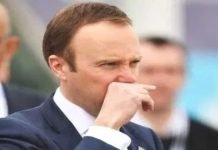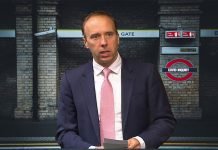
The UK now has the highest coronavirus death toll in Europe, according to official statistics.
A total of 32,375 deaths involving Covid-19 have now been registered across the UK – outstripping the death toll in Italy of 29,079.
This is statistic reflects not only the systematic failings of this Tory government in their slow response to lockdown and provision of PPE but the hurt and loss felt by countless family members of the 32k UK victims of Covid-19
The high death toll could increase political pressure on Prime Minister Boris Johnson, who waited longer than other European leaders to order a lockdown to curb the spread of the virus in March.
Weekly figures from Britain’s national statistics office added more than 7,000 deaths in England and Wales, raising the total for the United Kingdom to 32,313.
The figure is one of several methods for calculating deaths and is difficult to compare with other countries, but it offers the clearest sign yet that Britain could emerge as the worst-hit country in Europe, despite being hit later than other countries.
Although, like in other countries, popular support for the government has skyrocketed during the crisis, politicians are now coming under fire for shortages in personal protective equipment for healthcare workers and tests—shortages that experts say could have been avoided if the government had followed WHO advice. “The government was slow to act, didn’t give coronavirus the priority and attention it deserved and has made some significant mistakes,” says Professor John Ashton, a former regional director of public health in England. “They’ve handled it very badly.”
Early errors
Epidemiologists and former public health officials say the U.K.’s strategy for combating COVID-19 was muddled—leading to delays in purchasing essential equipment and tests, mixed messages about public health practices, and a lag behind its neighbors in implementing social distancing and other restrictions. That likely allowed the virus to spread fast and undetected.
Britain’s first mistake, according to Ashton, came around the time when the coronavirus was first confirmed in England, on Jan. 31. Prime Minister Boris Johnson chose not to chair a meeting of the government’s emergency COBRA committee, leaving his health secretary Matt Hancock to do so instead. “Because Johnson didn’t chair the meeting at the beginning of February, the government missed the opportunity to see that they needed to be ready to do lots of testing, that they would need to sort out stocks for personal protection and for oxygen and other supplies,” Ashton says.
Johnson’s decision not to step in until the beginning of March was “a surprise” that allowed shortages of vital health equipment, including tests, to sneak up on the British government, says Dr. Liam Smeeth, an epidemiologist at the London School of Hygiene and Tropical Medicine. The mistake, he says, was that the government placed too much confidence in Britain’s scientists and doctors, without doing enough to obtain the scarce equipment they required to do their jobs.
Despite Johnson announcing that Britain’s new focus was to “delay” the spread of the disease on March 12, it took four more days before he formally advised the public to begin socially distancing on March 16. In the meantime, at a press conference, his chief medical adviser mentioned the government’s long-term goal was for Britain to develop “some kind of herd immunity” against the disease, or in other words, letting a large percentage of the healthy population catch COVID-19 in order to prevent it from spreading to the most vulnerable. It was never official policy, but coming when it did, at a time of a policy vacuum, it sent a confusing message, epidemiologists said. “I think that was an error,” says Smeeth, the London School of Hygiene and Tropical Medicine professor. “Briefly, the government made it sound as if they were embracing the idea of herd immunity as a tool to control the epidemic, which I don’t think it was ever intended to be.”
That message changed swiftly on March 16, three days later, when a new scientific study by modelers at Imperial and the London School of Hygiene and Tropical Medicine arrived at Downing Street. It showed that the impact of the disease could be far worse than previously thought. If the government did nothing, 510,000 people would die, it predicted. If the government continued on its current course, the study said, the death toll would still swell to 250,000.
Later that same day, Johnson pivoted. People should work from home if they could, he said in an address to the nation, and “avoid” public venues like pubs and restaurants. His government did not, however, make these measures legally binding, nor did it explicitly tell businesses to close their doors. It would be a whole week until it did. (By comparison, Italy went into lockdown on March 9, Spain on March 14, and France on March 16.) On March 23, Johnson finally appeared on television to announce the country would go into lockdown the next day, with all non-essential travel banned and most businesses being forced to close.

“That week, between the 16th and 23rd when there was no formal lockdown, was the week when we could have gained time in a more aggressive lockdown,” says Ward, the epidemiologist from Imperial College London. Johnson’s long-held conservative belief in personal freedoms, says Ashton, had obstructed a public health imperative. “It was left to individuals to choose whether they went to the pub or not, until it got really bad,” Ashton says. “Eventually the government had to make those decisions, but reluctantly.”
The government’s line was that it was important to impose the measures at the right time — not too early, not too late — to ensure they coincided with the peak of the disease. “The right moment, as we’ve always said, is to do it when it is most effective, when we think it can make the biggest difference to slowing the spread of the disease,” Johnson said March 16.
Opposition parties have raised questions about Johnson’s initial decision to delay a lockdown at a time when hospitals in Italy were already being overrun.
They also say his government was too slow to introduce mass testing and provide enough protective equipment to hospitals.
The true figure for deaths from coronavirus may be even higher. The Office of National Statistics said 33,593 more people had died than average up to April 24 in England and Wales, compared to 27,365 cases in which coronavirus was mentioned on the death certificates.
(REUTERS) Part article and contribution Time
Support Independent Journalism Today
Our unwavering dedication is to provide you with unbiased news, diverse perspectives, and insightful opinions. We're on a mission to ensure that those in positions of power are held accountable for their actions, but we can't do it alone. Labour Heartlands is primarily funded by me, Paul Knaggs, and by the generous contributions of readers like you. Your donations keep us going and help us uphold the principles of independent journalism. Join us in our quest for truth, transparency, and accountability – donate today and be a part of our mission!
Like everyone else, we're facing challenges, and we need your help to stay online and continue providing crucial journalism. Every contribution, no matter how small, goes a long way in helping us thrive. By becoming one of our donors, you become a vital part of our mission to uncover the truth and uphold the values of democracy.
While we maintain our independence from political affiliations, we stand united against corruption, injustice, and the erosion of free speech, truth, and democracy. We believe in the power of accurate information in a democracy, and we consider facts non-negotiable.
Your support, no matter the amount, can make a significant impact. Together, we can make a difference and continue our journey toward a more informed and just society.
Thank you for supporting Labour Heartlands











